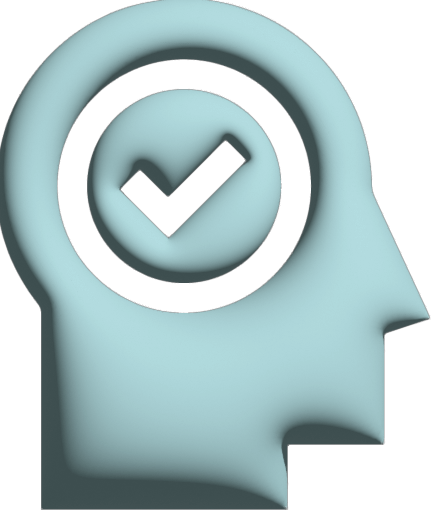Talk to us today
Talk to us today
Are you worried your child seems to have great difficulty with
maintaining attention?
Do they seem to get easily distracted and seem not to listen?
Does it take ages for them to get started on things and then often leave things unfinished?
As a parent, does your child’s endless energy, constant talking and
frequent interruptions due to
impatience
leave you feeling exhausted?

Attention-deficit/hyperactivity disorder (ADHD) is a neurodevelopmental disorder. It is characterised by a persistent pattern of inattention and/or hyperactivity-impulsivity that has a direct negative impact on academic, occupational, or social functioning. Everybody can have difficulty sitting still, paying attention or controlling impulsive behavior once in a while. For people who have ADHD, these difficulties are so pervasive and persistent that they interfere with their lives at home, in an academic setting, socially and at work.
Children with ADHD may behave younger than their peers, especially when developing independence. Looking back at developmental milestones, there may be some delays in things like language development, walking and co-ordination. Children with ADHD often have quite a low frustration tolerance and difficulty regulating their emotions.
Adolescents with ADHD may struggle with the transition to secondary school where there are greater academic and social demands as well as increased expectations around independence and organisation. Parents and teachers may have concerns that the young person is not reaching their full potential despite wanting to put the effort in but feeling like something is getting in the way. This can lead to low-self esteem and difficulties with their mental wellbeing.
It is important to remember that children and adolescents with ADHD are not always hyperactive as they may have the Inattentive subtype of ADHD. Many of the symptoms classified as ADHD symptoms of inattention are actually symptoms of executive function impairments. Executive function refers to a wide range of central control processes in the brain that activate, integrate, and manage other brain functions. Thomas E. Brown, Ph.D., of Yale University compares executive function to the conductor of an orchestra. The conductor organises, activates, focuses, integrates and directs the musicians as they play, enabling the orchestra to produce complex music. In a similar fashion, the human brain’s executive function organises, activates, focuses, integrates and directs. This allows us to hold facts in mind while processing information, get started on tasks, pay attention, complete tasks, think before acting and solve problems to name a few.
Children and Adolescents with ADHD also have some pretty amazing super powers. They can hyperfocus on things that interest them in a way that non-neurodivergent people can’t. Creativity in someone with ADHD can be fantastically out of this world. They are often the life and soul in a group and others love being in their company because they are such great fun. Being forgetful isn’t always bad as letting things go more easily and moving on to the next thing can be just what is needed.
The great news is that we continue to understand more about the struggles encountered by people who have ADHD and therefore have ways to offer support to help these difficulties. This includes recommendations around adjustments at home, school, individual therapy and pharmacological options. The team at Eton Psychiatrists would like the opportunity to be the professionals you trust with embarking on the journey to understanding your child’s difficulties and exploring the options on how to help your child thrive and reach their full potential. We are here to help children and adolescents as well as their families because we know the impact ADHD can have on the entire family unit.
If you would like to learn more about what your child’s journey would look like with us please follow: (tab for Child ADHD assessment and treatment pathway)

Your journey for an ADHD assessment with Eton Psychiatrists starts here! If you want to proceed with an assessment, or if you want more information before deciding, contact our dedicated team of medical secretaries and clinicians at info@etonpsychiatrists.co.uk or 020 4586 8616
We will aim to respond to your query within 72 hours by email. If you have an urgent query, please do not hesitate to call us. If the query is of a clinical nature, we will contact one of our dedicated psychiatrists to ensure that all your questions are answered promptly, and in full.
If you then decide to proceed with an assessment, we will then ask you for some information, to help your psychiatrist prepare for your appointment.

Your psychiatrist will want to know a little bit about you, and the symptoms that you have been experiencing, in order for the assessment to be focused on your difficulties.
We will send a small number of brief questionnaires that evaluate the presence of different ADHD symptoms, as well as symptoms of anxiety and depression.
It is also helpful to hear from those close to you, about any ADHD symptoms that you have experienced. We will ask for someone who has known you well for at least the last 6 months to complete a brief questionnaire; this could be a friend, flatmate, spouse or other relative.
We will also ask for a questionnaire to be filled in by someone who had parental responsibility for you from the ages of 5 – 12. If you have any difficulties in finding the right people, don’t worry just let us know!
With your permission, we will also write to your GP / ask you to provide us with a summary of your medical history, as well as completing our registration form and providing us with a form of ID.
This might sound like a lot to do! We keep our questionnaires as brief as possible, and our team will provide you with clear information on how to complete the pre-assessment forms. They should take around 1 hour to complete in total.
Whilst you are completing your onboarding, let the team know about your availability for an assessment, whether you would like to have the assessment remotely, or face to face, and if you have a preference for a particular psychiatrist that you would like to see. We aim to offer assessments within 2 weeks of your enquiry.
You are now ready for your assessment! One of our team will provide you with an appointment link, or directions to our Harley Street clinic. Please do not hesitate to contact us if you have any further questions leading up to your appointment!

At Eton Psychiatrists, we offer 2 types of assessment: a diagnostic assessment, lasting 60-90 minutes, and a diagnostic assessment with treatment discussion that will last between 90-120 minutes. If you choose this assessment, your psychiatrist will perform a full diagnostic assessment and will also discuss treatment with you, if a diagnosis of ADHD is made.
Prior to your appointment, your psychiatrist will have reviewed all your pre-assessment information, and will spend some time in the assessment getting to know you better. Your psychiatrist will ask you questions about any current symptoms of ADHD, and how they might be impacting upon your work, your study, or your home life. They will also enquire about these symptoms in childhood, and other aspects of your background, such as your education, employment, relationships, and medical history.
All of this will allow your psychiatrist to deliver a comprehensive ADHD assessment, meeting or exceeding NICE guidelines. In the large majority of cases, your psychiatrist will be able to come to a conclusion as to the diagnosis in the assessment. Occasionally, more information will be required. If this is the case, this will be clearly explained to you and a further feedback appointment will be offered free of charge to discuss the diagnosis, once any further information has been reviewed.
If a diagnosis of ADHD is made, your psychiatrist will outline to you some guidance as to next steps. If you chose to have the treatment discussion appointment, then your psychiatrist will spend the rest of the appointment taking you through, in detail, the various options for treating ADHD, and answering any questions that you may have along the way. This will include information about lifestyle changes, psychological therapy, stimulant and non-stimulant medication.
If a diagnosis of ADHD is not made, then do not worry, we will refund you the difference!

At Eton Psychiatrists, we offer 2 types of assessment: a diagnostic assessment, lasting 60-90 minutes, and a diagnostic assessment with treatment discussion that will last between 90-120 minutes. If you choose this assessment, your psychiatrist will perform a full diagnostic assessment. If a diagnosis of ADHD is made, and you later decide that you want to trial medication, you will require an additional 30-minute appointment to discuss treatment options with you in detail.
Prior to your appointment, your psychiatrist will have reviewed all your pre-assessment information and will spend some time getting to know you better. Your psychiatrist will ask you questions about any current symptoms of ADHD, and how they might be impacting your work, your study, or your home life. They will also enquire about these symptoms in childhood, and other aspects of your background, such as your education, employment, relationships, and medical history.
All of this will allow your psychiatrist to deliver a comprehensive ADHD assessment, meeting or exceeding NICE guidelines. In the large majority of cases, your psychiatrist will be able to come to a conclusion as to the diagnosis in the assessment. Occasionally, more information will be required. If this is the case, this will be clearly explained to you, and a further feedback appointment will be offered free of charge to discuss the diagnosis, once any further information has been reviewed.
If a diagnosis of ADHD is made, your psychiatrist will outline some guidance as to the next steps. However, an additional appointment would be required in order to discuss treatment options in more detail.

At Eton Psychiatrists, we pride ourselves on our high level of post-diagnostic support. We think that it is important to go further than other clinics and provide you with detailed information about your diagnosis, curated useful resources, and detailed information on treatment options and lifestyle advice. This will be provided to you electronically and as a complement to any discussion that you may have with your psychiatrist about treatment options. This information pack will be personalized for your individual needs.
Your psychiatrist will then start work on your detailed assessment report, which will be delivered to you within 2 weeks of your appointment. If you require proof of diagnosis more urgently, a brief letter will be provided to you within 48 hours. Please carefully read your report, and let one of our team know if you want to request any amendments.
At any point after your diagnosis, if you decide that you would like to pursue treatment for your ADHD, let one of our team know and we will enter you into the treatment pathway. If you have any further queries about your report or diagnosis, then please do not hesitate to contact us!

If you chose the 60-90 minute diagnostic appointment, and later decide on entering the treatment pathway, you will need to meet with your psychiatrist for another appointment.
They will take you through, in detail, the various options for treating ADHD, answering any questions that you may have along the way. This will include information about lifestyle changes, psychological therapy, and stimulant and non-stimulant medication.
